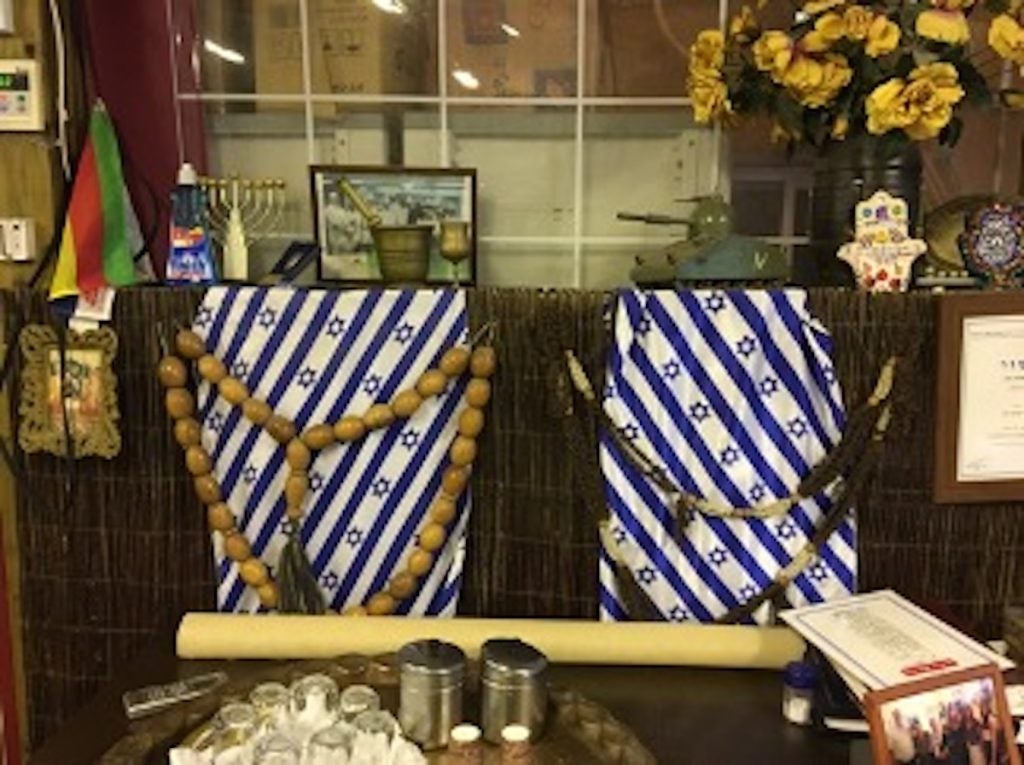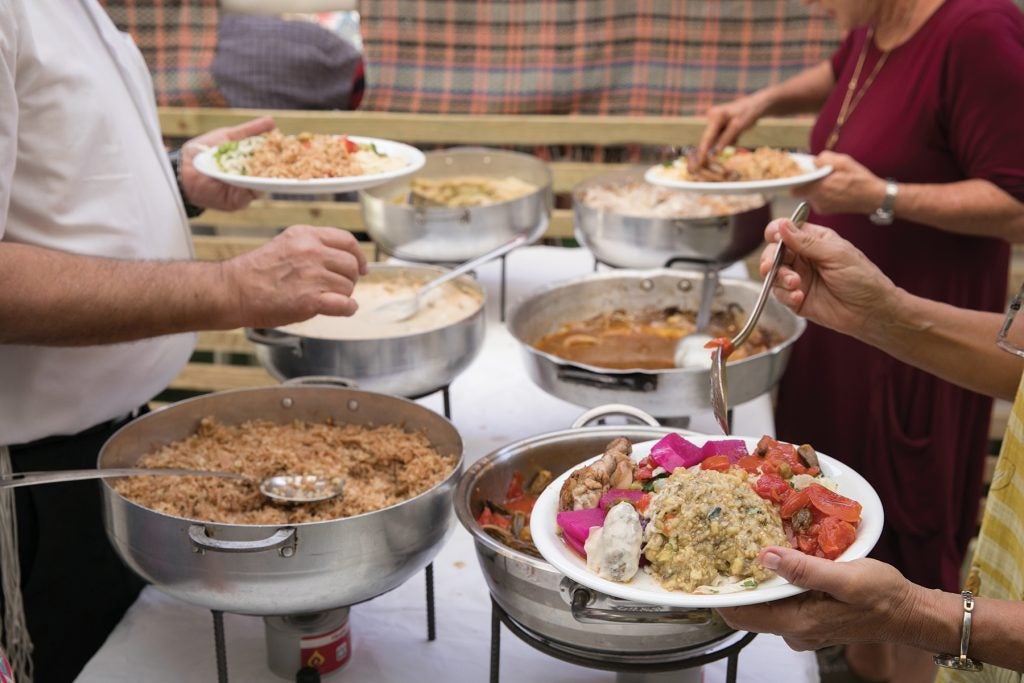
How one woman’s restaurant reveals the intersections of ethnicity, militarism, and nationalism at play in culinary tourism
By Dr. Lindsey Pullum
Maisa* has turned her modest home on her sleepy residential street into the most popular eatery in the Israeli Druze village of Daliyat al-Carmel. To get there, tourists take the 672 road out of Israel’s port city, Haifa, and climb the mountain north before turning off the main road that leads to the famous Druze Saturday Market. Maisa’s restaurant is part food stop, part cultural museum. With a long, bricked parking lot for 40-passenger buses, the neighborhood transforms daily into a small tourist hub. As you walk in, the enlarged portrait of the late Druze spiritual leader Sheikh Amin Tarif hangs directly in front of the open doors. The coffee stand garners much attention from tourists with a fabric designed with Israeli flags draped down from a window ledge. The fabric is held up by a brass menorah and a miniature metal tank, while a significantly smaller Druze flag is off to the side. Displayed with prominence next to the Israeli flag fabric is a certificate of kosher status, important for any Jew who might adhere to kosher food laws. These displays will soon fade from tourists’ attention once food is served, but for the time being, their function is unambiguous. The stand encapsulates the dominant narrative of brotherhood and patriotism told about a sect within Israel’s Arab minority.
The relationship between the Druze people, an ethnic and religious minority of Israel (non-Jewish, non-Muslim, Arab), and Israel is often told with definitive simplicity, but upon closer investigation Israeli Druze are caught between colonial subjectivities that underpin Israeli society. Since Israel’s statehood, funding for tourism development was granted to “good” minorities, like Druze and Bedouin communities, who demonstrated substantial allegiance to the Israeli state. Original efforts to draw tourists to Druze villages hinged on food markets and Druze cuisine, as certain Arab-Palestinian spaces for consuming food were deemed too dangerous (physically and ideologically). But by the mid-90s—a period of peace following the Oslo Accords—Muslim and Christian Arab villages were becoming hubs of Jewish leisure and tourism. This shift left Druze to redefine and distinguish themselves from the now newly accessible spaces of Arab food tourism.

Druze women now find themselves operating within this Arab-Israeli discourse of difference, in addition to navigating the internal norms about the role of women in Druze society. Touring Druze villages, specifically for food, opens up an avenue for Druze women to perform Israeli nationalism that combines Druze cuisine and culture with Kosher cuisine and Jewish culture. Druze women’s generational knowledge of cooking Druze food makes them particularly well equipped to create new culinary tourism experiences. In the largest Druze village of Israel, Maisa has the only female-owned and operated restaurant; moreover, her restaurant is the only kosher one in a town flooded with hungry Jewish-Israelis.
Food and culinary presentation are, as part of national discourse, subject to a nation’s ethos, values, and institutions. In Israel, military service, religion, and the Arab-Israeli conflict are the largest social forces that shape national discourse, and food responds to these forces. Druze women, such as Maisa, working in culinary tourism engage with the Jewish nation and conceive of themselves through a process I call culinary militarism—the process by which foodways become a tool used by civilian actors to consent to state violence. Maisa and her matrilinear network use feminine knowledge in conjunction with dominant foodways to connect to and then commodify military discourse for culinary tourists in order to align herself (and the larger Druze community) with the Jewish-Israeli nation.
Her decision to keep kosher, working with a local Rabbi to follow kosher ordinances, privileges and protects Jewish Israeli norms from the encroachment of Arab culture. The physical dining room is a curated space for performing belonging through paramilitary narrative and texts. Lining the longest wall of the restaurant are numerous photographs, collages, and official certificates of hospitality given to Maisa by platoons and police stations. Her mid-dinner monologue describing her family’s military service frames Maisa as part of a lineage of patriots (even though Druze women are forbidden from serving in the Israeli Defense Forces). Finally, difference between Druze and Palestinian food (and people) is articulated through language, using Hebrew, Arabic, and English to negotiate Druze similarities with Jewish-Israelis and obscure differences to Arab-Palestinians. For example, she narrates her life in Hebrew to Jewish tour guides, who translate in English. Then, as she or her sisters deliver food to tables or refill lemonade pitchers, they code switch in front of tourists to Arabic with me, asking if their guests like the food. The introduction of Arabic into tourists’ experience adds an unexpected layer of authenticity.
Druze food and culinary tourism to Druze villages, made more prominent by Maisa’s success, has been influential in conveying Druze belonging to the state of Israel and creating a space for dialogue about Arab equality and rights. Such dialogue regarding Arab equality has never been more important in the wake of the Nation-State Law of 2018 and the continued marginilization of Israel’s Arab-Palestinian citizens.
*Maisa is a pseudonym being used to protect the identity of the restaurant owner, per IRB protocol.
Dr. Lindsey Pullum is the 2021-2022 American Druze Foundation Fellow at CCAS. This article is a short summary of her chapter “My Mother’s Recipe, My Nation’s Narrative: Intersections of food, militarism, and masculinity in Maisa’s Kitchen,” which will be published in the forthcoming Rowman & Littlefield volume Re-Centering: Postcolonial Feminist Ethnographies of Tourism (edited by Frances J. Reimer).
This article appeared in the Winter/Spring 2022 CCAS Newsmagazine.